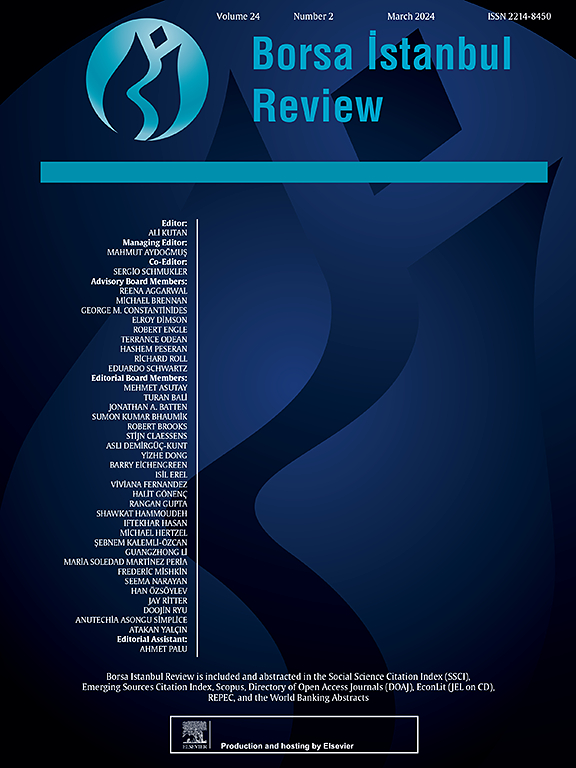股市对经济制裁的反应:评估国家储备和金融市场准入的作用
IF 7.1
2区 经济学
Q1 BUSINESS, FINANCE
引用次数: 0
摘要
经济制裁严重影响股票市场资本化,并对国家经济产生重要影响。本研究以 2000 年至 2021 年的 87 个国家为样本,采用两步系统广义矩法(GMM)分析面板数据,调查了经济制裁对股票市场资本化的影响,重点研究了国家储备和金融市场准入在缓解这些影响方面的作用。研究结果表明,包括贸易和金融制裁在内的经济制裁会显著降低股票市场资本化。然而,随着时间的推移,这种负面影响会随着市场的适应而减弱。此外,较高的国家储备和增强的金融市场可进入性可以减轻制裁的不利影响。对俄罗斯、伊朗、中国和乌克兰的案例研究进一步验证了这些结果。本研究通过纳入制裁强度、国家储备和金融市场可得性,完善了资本资产定价模型(CAPM)和国家风险模型(CRM)等经济模型,为政策制定者和投资者应对国际制裁提供了有价值的见解。本文章由计算机程序翻译,如有差异,请以英文原文为准。
Stock market responses to economic sanctions: Evaluating the roles of national reserves and financial market access
Economic sanctions significantly influence stock market capitalization and have critical implications for the national economy. This study investigates the impact of economic sanctions on stock market capitalization, focusing on the roles of national reserves and financial market access in mitigating these effects, utilizing a sample of 87 countries from 2000 to 2021 and employing a two-step system generalized method of moments (GMM) approach to analyze panel data. The findings reveal that economic sanctions, including trade and financial sanctions, significantly reduce stock market capitalization. However, this negative impact diminishes over time as markets adapt. Moreover, higher national reserves and enhanced financial market accessibility can mitigate the adverse effects of sanctions. Case studies in Russia, Iran, China, and Ukraine further validate these results. This study refines economic models, such as the capital asset pricing model (CAPM) and country risk model (CRM), by including sanction intensity, national reserves, and financial market accessibility, offering valuable insights for policymakers and investors dealing with international sanctions.
求助全文
通过发布文献求助,成功后即可免费获取论文全文。
去求助
来源期刊

Borsa Istanbul Review
Multiple-
CiteScore
7.60
自引率
3.80%
发文量
130
审稿时长
26 days
期刊介绍:
Peer Review under the responsibility of Borsa İstanbul Anonim Sirketi. Borsa İstanbul Review provides a scholarly platform for empirical financial studies including but not limited to financial markets and institutions, financial economics, investor behavior, financial centers and market structures, corporate finance, recent economic and financial trends. Micro and macro data applications and comparative studies are welcome. Country coverage includes advanced, emerging and developing economies. In particular, we would like to publish empirical papers with significant policy implications and encourage submissions in the following areas: Research Topics: • Investments and Portfolio Management • Behavioral Finance • Financial Markets and Institutions • Market Microstructure • Islamic Finance • Financial Risk Management • Valuation • Capital Markets Governance • Financial Regulations
 求助内容:
求助内容: 应助结果提醒方式:
应助结果提醒方式:


